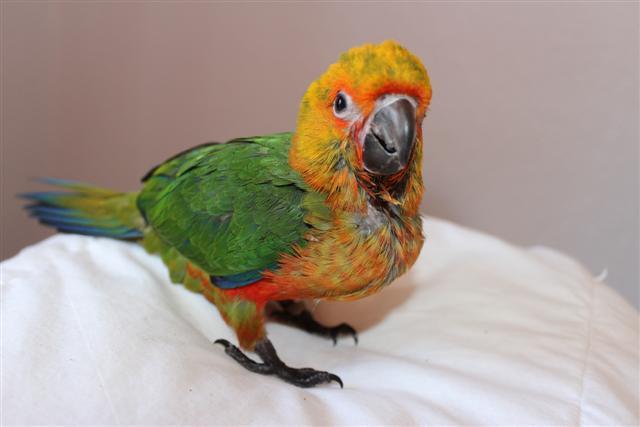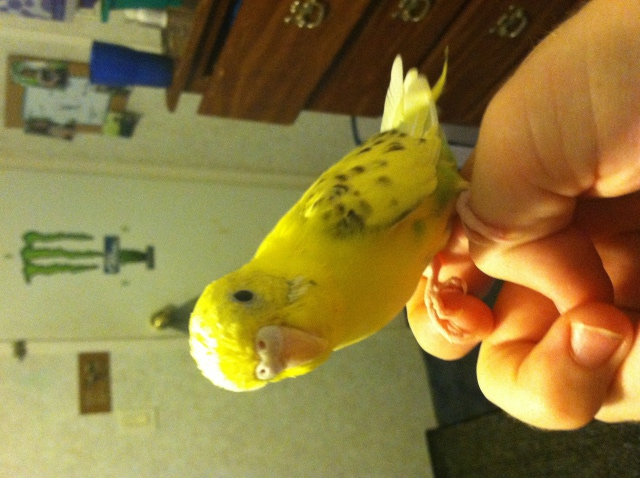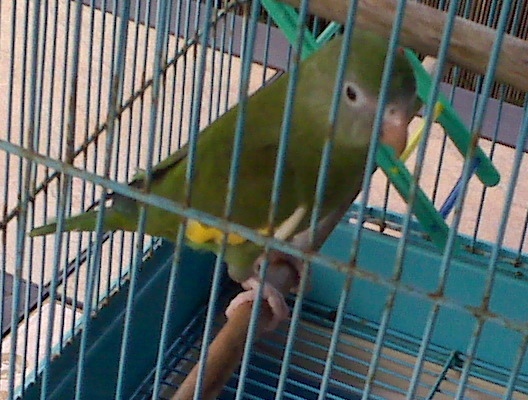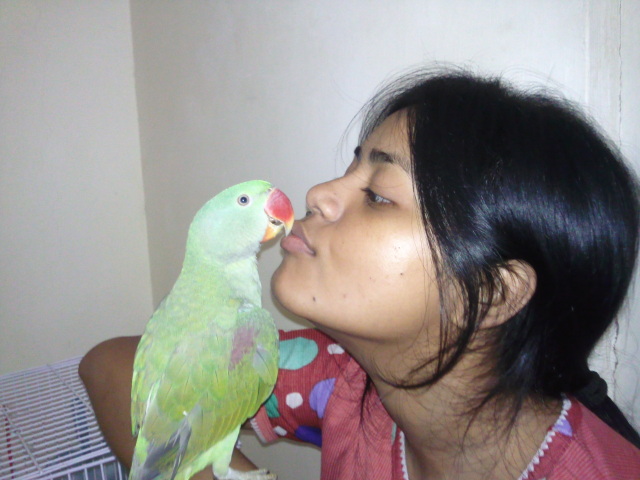QuestionQUESTION: I have had this bird for several months (her name is Trinity and was one of the bird stolen from pjs and then returned). She is around a year old and is a Meyer's parrot. She eats Egg-cite protien fortified bird seed for parrots, lifetime sticks/granules, some other brand name fortified bird food (no peanuts though), and human food (like grapes, apple, bread, yogurt, and other things bird safe). This is pretty recent.
I started a new job that requires me getting up early. My poor sweetie has been suffering as a result because I have to open the curtains when the sun has yet to rise (or now just barely rising). Before she was used to sleeping in until noon but now she is up early and when I take her out of her cage she is awake for a little while then sleeps. An example is today. I got home around 5pm and was reading a bird magazine (she was tearing it up) andn around 6:30pm I fell asleep on the couch. I assume she did too. I woke up around 7pm and my little birdie has been sleeping pretty steady. She has recently been to the vet for a check up and was pronounced healthy but I worry about her. Is this just her adjusting to our new scheduale?
ANSWER: Hi Megan,
First let me talk about the diet. Are you giving her any kind of pellets at all? If not, I would urge you to get her converted onto a pelleted/seed diet as well as continue with the other fresh foods you're giving her. Seed only, as a staple diet is very unhealthy and due to guaranteed health issues later in life - her life span will likely be cut in half. Seeds have little nutritional value and are high in fat. I have a few birds in my flock who were on seeds only before they came to me (one was 10 when he came to me and one was 18) and both suffer fairly serious health issues because of it. I've got all of my birds converted to a 80% Roudybush pellets | 20% Volkman seed mix in addition to fresh fruits, veggies, and mashes. Pellets are essential because they provide many nutrients that are not found in seeds. Some good brands of pellets are Roudybush and Harrisons - but they are not readily available in your average chain pet store such as petsmart or petco. If PJs has either of those brands, I would seriously recommend getting her on one of them. If not, Zupreem NATURAL pellets would be the next best choice. Zupreem offers a fruity pellet that actually looks like it would taste great to me in a bowl of milk (LOL) but because of the artificial coloring and flavoring in them - they can cause some allergy issues in birds.
If you decide to do this, that's great - but you have to do so very slowly and gradually. You have to be consistent as well. A major reason so many birds are on an all seed diet is because we give up too soon on giving them new healthier foods. Some offer them once and the bird won't touch them so in our minds - the bird doesn't like it. That couldn't be further from the truth. Birds are very visual eaters... they don't have the best sense of taste or smell, so they rely very much on visual familiarity for eating. Therefore, it's crucial that these new things CONTINUALLY be offered to them, everyday for several weeks. As far as the pellets are concerned... some of my birds took to them immediately! Some of them, it took a few weeks. But they are ALL now on them and they all eat them.
To convert your baby gradually - start decreasing the seed and increasing the pellet every week, making sure that she's still eating and drinking throughout the whole process. Week one - do 90% seed | 10% pellet. Week two - 80% seed | 20% pellet and so on. When you get to the point where she has 60% pellet and 40% seed REALLY pay attention and see if you can determine if she's eating the pellets yet. To do so - if you see pellet crumbs in the bowl or partial pellets on the cage floor - this is a good indication - if you can't see her doing it herself. Just keep an eye on her throughout, she'll likely still pick out the seeds first... but once she realizes that they are gone from the bowl and she's still hungry (this happens as there are more pellets than seeds in the bowl) she'll go back for the pellets that she's now come to recognize as food in the dish. All of my birds eat the seeds FIRST in the morning. Then throughout the day, they go and munch on their pellet.
Ok - onto her sleep schedule. Honestly Megan, it's a GREAT thing that this schedule has changed! Birds were not built to stay up long past sunset and sleep 'til noon. In the wild (and in most bird homes I know) they start settling in around sunset and get up in the very early morning. This is something that is built into every bird instinctively... no matter where they were born. Having said that - a little adjustment can be made in a home as long as it's not detrimental to the birds physical and mental health. Birds do suffer from sleep deprivation... and they will start experiencing health issues AND behavior issues if they don't get enough QUALITY sleep every night. All birds need at least 10 - 12 hours of dark, uninterrupted sleep every night. Daylight and sleep play a very important role in the life of every bird. Daylight regulates many things in their body and sleep allows them to restore themselves and gather the energy for a new day - just as it does for us.
I have nine birds. And no, they don't go to bed when the sun sets and wake up before dawn as they might in the wild. However, I do make sure that they get to bed by 8 - 9pm and that they get their 10 - 12 hours. If they go to bed at 8pm, I wake them up at 8am the next morning... and that's because I am currently not working during the day and am home. When I go back to work, they will likely get up around 6:30 - 7am with me and still go to bed around 8pm at night. As long as they get the minimum 10 hours. I also cover all of their cages at night and make sure that the room they are in while sleeping is dark and quiet throughout the night. They are kept in our living room... so when I put them to bed at 8pm, we may stay up and watch an hour of TV, but we do so in the dark with the TV at a very low volume. But I do know that they are NOT sleeping as they should be while I'm even watching TV in the dark.
So it's ok that her schedule has changed - but since you didn't have a chance to change it gradually - you have to be extra vigilant and make sure she's doing ok with it (eating drinking not showing any signs of illness). I know some people who put their birds to bed at 6pm at night - depending on the season, and get them up at 5am. This is ok too. Some birds get very hormonal in the spring and summer months - so regulating the amount of daylight they get is important to prevent any problems there. It's ok to put your bird to bed at 7, 8, or 9pm at night or even a tad earlier if necessary, just be sure that she gets her 10 - 12 hours every night. I can't stress the importance of that enough. :-)
I hope this information helps and feel free to follow up with any other questions or concerns you may have.
Best wishes.
---------- FOLLOW-UP ----------
QUESTION: She is on a seed and pellet diet. My little sweetie has also those granules and lifetime sticks (she adores the sticks) and on some tropimix food. She sleeps with two lovebirds (they get along surprisingly well) with a heat lamp on (my room gets too cold at night even in the summer. The boys go to sleep when the lights go off.
I got her on some water with iodine in it because I suspect she's molting and the breeder said it would help. I'm glad that this is nothing that requires a vet trip. I have lost too many birds and now am paranoid.
Thank you for my peace of mind
AnswerHi again,
I would definitely STOP giving her iodine. Some birds have a deficiency where a supplement is necessary but those who don't - iodine can be harmful. There are other things you can do to help with the moulting... Aloe Vera Juice spray baths (mixed with water) are VERY good for them and it's completely non toxic. It's one part AVJ to 3 parts water in a spray bottle. AVJ soothes the skin and helps the feathers.
I would definitely stop giving the idodine UNLESS an avian vet tells you to give it to her. And even in that case - there are other way to give it to her (such as a supplemental kelp). My rule of thumb is to research every suggestion I'm ever told to do with one of my birds. A perfect example of this is a pet store told me (when I first started keeping birds) to give my bird GRIT to aid in digestion. I went home and researched this and found out that not only do parrots NOT need grit, it can kill them! Only birds who eat seeds whole (chickens, doves, pigeons) and cannot hull the seeds out with their beaks need grit.
I belong to a great parrot forum I also recommend to many people. It's thee best parrot forum on the net where you can share stories and get advice from LOTS of other fellow bird owners. www.theperch.net
Good luck and best wishes!

 Jenday Conure Weaning?
Question
Castor the Conure
Hi
I have a 9 week o
Jenday Conure Weaning?
Question
Castor the Conure
Hi
I have a 9 week o
 Parakeet gender
Question
Parakeet
Hi, I looked for an expert und
Parakeet gender
Question
Parakeet
Hi, I looked for an expert und
 ID Birds
Question
Panama Birds
My uncle served in Panama in 1941
ID Birds
Question
Panama Birds
My uncle served in Panama in 1941
 What type of parrot is this?
Question
Friendly bird
A week ago ths small parrot flew
What type of parrot is this?
Question
Friendly bird
A week ago ths small parrot flew
 can i give my parrot chole(chana) called in hindi
Question
my little chaddi alexa
dear sir,
can give chan
can i give my parrot chole(chana) called in hindi
Question
my little chaddi alexa
dear sir,
can give chan